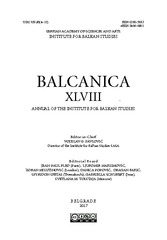Приказ основних података о документу
Regent Alexander Karadjordjevic in the First World War
| dc.creator | Bakić, Dragan | |
| dc.date.accessioned | 2019-03-25T21:24:21Z | |
| dc.date.available | 2019-03-25T21:24:21Z | |
| dc.date.issued | 2017 | |
| dc.identifier.issn | 0350-7653 | |
| dc.identifier.issn | 2406-0801 | |
| dc.identifier.uri | http://www.doiserbia.nb.rs/Article.aspx?ID=0350-76531748191B | |
| dc.identifier.uri | https://dais.sanu.ac.rs/123456789/5243 | |
| dc.description.abstract | This paper analyses the role played by Regent Alexander Karađorđević in Serbia’s politics and military effort during the First World War. He assumed the position of an heir-apparent somewhat suddenly in 1909, and then regency, after a political crisis that made his father King Peter I transfer his royal powers to Prince Alexander just days before the outbreak of the war. At the age of twenty-six, Alexander was going to lead his people and army through unprecedented horrors. The young Regent proved to be a proper soldier, who suffered personally, along with his troops, the agonising retreat through Albania in late 1915 and early 1916, and spared no effort to ensure the supplies for the exhausted rank and file of the army. He also proved to be a ruler of great personal ambitions and lack of regard for constitutional boundaries of his position. Alexander tried to be not just a formal commander-in-chief of his army, but also to take over operational command; he would eventually manage to appoint officers to his liking to the positions of the Chief of Staff and Army Minister. He also wanted to remove Nikola Pašić from premiership and facilitate the formation of a cabinet amenable to his wishes, but he did not proceed with this, as the Entente Powers supported the Prime Minister. Instead, Alexander joined forces with Pašić to eliminate the Black Hand organization, a group of officers hostile both to him and the Prime Minister, in the well-known show trial in Salonika in 1917. The victories of the Serbian army in 1918 at the Salonika front led to the liberation of Serbia and the formation of the Kingdom of Serbs, Croats and Slovenes (Yugoslavia), while Alexander emerged as the most powerful political factor in the new state. [Project of the Serbian Ministry of Education, Science and Technological Development, Grant no. 177011: History of political ideas and institutions in the Balkans in the 19th and 20th centuries] | en |
| dc.language | en | |
| dc.publisher | Belgrade : Institute for Balkan Studies, Serbian Academy of Sciences and Arts | |
| dc.relation | info:eu-repo/grantAgreement/MESTD/Basic Research (BR or ON)/177011/RS// | |
| dc.rights | openAccess | |
| dc.rights.uri | https://creativecommons.org/licenses/by-nc-nd/4.0/ | |
| dc.source | Balcanica | |
| dc.subject | Regent Alexander Karadjordjević | |
| dc.subject | Serbia | |
| dc.subject | World War I | |
| dc.title | Regent Alexander Karadjordjevic in the First World War | en |
| dc.type | article | en |
| dc.rights.license | BY-NC-ND | |
| dcterms.abstract | Бакић, Драган; | |
| dc.citation.spage | 191 | |
| dc.citation.epage | 217 | |
| dc.citation.issue | XLVIII | |
| dc.identifier.wos | 000428225200009 | |
| dc.identifier.doi | 10.2298/BALC1748191B | |
| dc.type.version | publishedVersion | |
| dc.identifier.fulltext | https://dais.sanu.ac.rs/bitstream/id/16517/bitstream_16517.pdf | |
| dc.identifier.rcub | https://hdl.handle.net/21.15107/rcub_dais_5243 |

